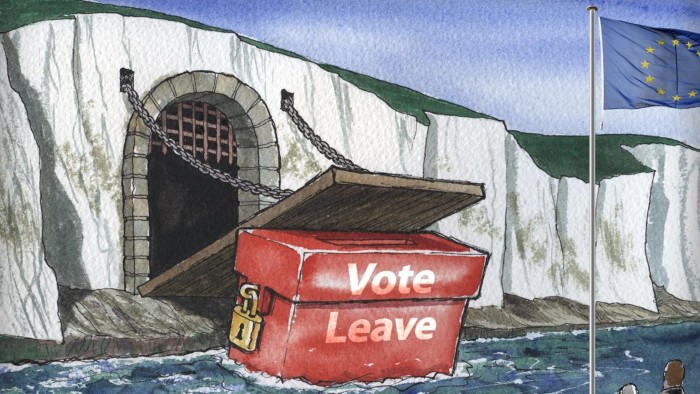Immigration could swing it for Brexit


Roula Khalaf, Editor of the FT, selects her favourite stories in this weekly newsletter.
In the referendum campaign on Britain’s membership of the EU, each side has one trump card that they will play repeatedly until voting day on June 23. The Remain camp will talk about the economy. The Leavers will talk about immigration.
Many diehard Remainers regard the Leave campaign’s stress on immigration as proof that it is a movement that ultimately rests on racism and xenophobia. But immigration is a legitimate issue in this campaign. Indeed, the Leave side would be stupid not to use it since, when voters are asked to name their concerns, they regularly put immigration at the top of the list. In 2015, net migration to the UK hit 333,000, the second-highest number on record, with about half that number coming from the EU.
For the Leave campaign, immigration from Europe is a gift because it perfectly captures three of the themes that the “Outers” most like to stress: loss of sovereignty, the faulty judgment of elites and the difficulty of achieving meaningful reform of the EU.
Hardcore Eurosceptics in the Conservative party have been complaining about loss of sovereignty for decades. But the things that enraged them, such as the EU’s working time directive, are not the sorts of issues that normal people lose sleep over.
By contrast, immigration provides a meaningful practical example of what “loss of sovereignty” actually entails. After the arrival of more than 1m migrants from eastern Europe over the past decade, some British voters wanted to call a halt. That put David Cameron, the prime minister, in the awkward position of having to explain that the UK government is powerless to control the flow of migrants from the rest of the EU. The EU’s rules on the free movement of people mandate that all EU citizens have the right to live and work anywhere within the 28-country bloc.
One of the basic characteristics of a nation state has traditionally been the right to decide who can live in the country and enjoy the benefits of citizenship. Many voters instinctively feel that this is the way it should still be. But that traditional sovereign right has indeed been sacrificed (or pooled, if you prefer) by EU members.
The British government’s failure to anticipate the scale of migration from eastern Europe has also fed the public’s scepticism about official pronouncements on the EU. Just before the enlargement of the EU in 2004 to include 10 new members, the government predicted that an average of 13,000 migrants a year would move to Britain from the newly extended bloc. In the event, the figure was more than 10 times that. After this miscalculation, it is hardly surprising if the public now reacts sceptically to government figures about the economic impact of leaving the EU.
Once the scale of the immigration into Britain became clear, the UK government tried to secure changes in the EU’s rules on the free movement of people. In October, in the early stages of his attempted re-negotiation with the EU, Mr Cameron promised to “sort” the issue and insisted, “I will not take no for an answer.”
But the Cameron re-negotiation merely highlighted a third Eurosceptic complaint about the EU: that it is an organisation that finds it all-but-impossible to reform itself.
The rules on free movement are one of the “four freedoms” that are regarded as basic to EU membership. But even if there had been leaders around the negotiating table who agreed with Mr Cameron that something needs to change, it was always going to be impossible to secure the agreement of each of the other 27 member states, many of which were under strong domestic pressure to fight for continued free movement of people. Instead, Mr Cameron had to settle for a much weaker reform: delays in the payment of welfare benefits to EU migrants.
Of course, it is also true that there are elements of dishonesty and xenophobia in the way the Leave campaign has used immigration. The Leavers have sometimes deliberately blurred the distinction between legal immigrants from the EU and asylum seekers fleeing the Middle East — a powerful tactic, given the current refugee crisis in Europe. Nigel Farage, one of the most prominent Leave campaigners, has even evoked sexual assaults by migrants in Germany as a reason to quit the EU.
At the same time, the Leave campaign has appealed to UK voters with roots outside Europe — by suggesting that if Britain leaves the EU it could adopt an immigration policy that allows in more migrants from India and Pakistan. That idea is unlikely to delight the Leavers’ core vote in the white working class.
As far as I can see, large-scale migration from Europe has benefited Britain. And many important institutions, from the National Health Service to my local coffee shop, would struggle to get by without it. But then again, as an affluent Londoner, it is predictable that I would take a relaxed view of immigration.
However, at a time when real wages are stagnant, house prices are rising and public services are creaking, many British people are susceptible to the argument that high immigration is making such problems worse.
Are these concerns about immigration — real and imagined — enough to overwhelm the economic and strategic case for staying inside the EU? Not as far as I am concerned. But I will not be remotely surprised if Britain decides differently on June 23.
Letter in response to this column:
Immigration issue may allow the limbic brain to prevail/ From Dennis J D Sandole
Comments